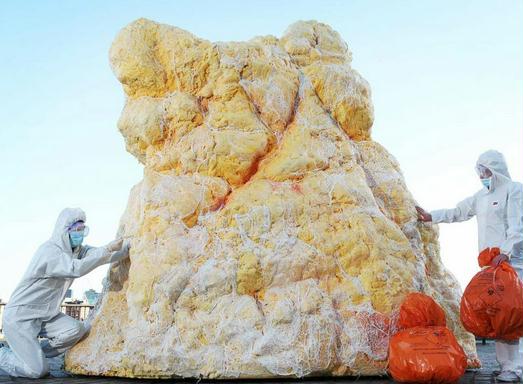 Fatberg from London sewer
Fatberg from London sewer
If the U.S. can’t make enough biodiesel from plants, then the question becomes: Can we step up our fast-food game? Can we eat more French fries? Biodiesel is already made from used cooking oil (11.5% of all U.S. biodiesel), animal and other fats (5%).
We could also scrap other products made from vegetable oils and animal fats and shift them to biodiesel. Products like soap, paint, varnish, vinyl plastics, lubricants, livestock and pet food, clothes, rubber, detergents, candles, rust inhibitor, shampoo, caulking, disinfectants, epoxies, electrical insulation, metal casting, plasticizers, and more (Murphy 2004). Who knew we are swimming in vegetable oils and animal fats!
Using restaurant waste grease helps stop the problem of it being illegally dumped into the sewage system, which can result in severe blockages. Once restaurant grease clogs a sewer, sewage may back up into the facility, shutting it down until the sewage pipe is cleaned. In London, sewers were clogged with a record-breaking fatberg that weighed 140 tons. Picture that!
Currently hotels and restaurants generate three billion gallons of waste cooking oil, though most ends up in landfills or down the drain rather than biodiesel (EPA 2017). That is a gob of grease, but a far cry from the 46 billion gallons of petroleum diesel consumed.
We will just have to belly up and eat a lot more deep-fried food. At last, we’ll have a good excuse to eat fried chicken and French fries with no guilt! If anyone can eat more fast food, it’s Americans. Already 72% of adults are overweight or obese (CDC 2016). We’re really good at eating. Spin eating fried food as a patriotic duty and it will be the most popular government edict ever.
Believe it or not, there are statistics on our personal grease consumption. About four gallons of used cooking oil and trap grease are generated per person per year (NREL 1998). Thank you for that important information NREL! With 329 million people, that’s about 1.3 billion gallons. Americans are going to have to eat at least 15 times more fast food to nudge biodiesel production to half of oil diesel consumption. Though obesity may shorten American lifespans, it won’t be in vain. After death, excessive human fat can be rendered to make even more biodiesel to allow us to continue to our nonnegotiable way of life. Plus, liposuction clinics could harvest fat periodically. Americans could eat as much as they liked all the time, and we’d forever end the pain of dieting (Squatriglia 2007).
It’s too bad truck drivers running on empty can’t just pull up to a fast food joint and say fill ‘er up while eating fried food to keep the virtuous biodiesel cycle going. Sadly, unrefined vegetable oil, grease, or animal fats would harm their engine. Restaurant grease has to be trucked to a biodiesel refinery, pretreated to remove dirt, meat scraps, breading, and water, phospholipids and plant matter degummed. Making biodiesel from cooking oil and trap grease is especially tricky because of their free fatty acids, which tend to react with catalysts to produce soap instead of biodiesel. The more soap made, the more soap and methanol that need to be removed and discarded, with some of the methanol and glycerol disposed of as hazardous waste. And to think this glob all began with French fries!
Conclusion. Seriously, Americans aren’t going to be able to eat enough fast food. Seriously, we are already too heavy. In an energy scarce world, it will be far better and healthier to live close to work and use muscle power, walking and bicycling, to get there. Seriously. Not that there will be any choice…
Alice Friedemann www.energyskeptic.com Author of Life After Fossil Fuels: A Reality Check on Alternative Energy; When Trucks Stop Running: Energy and the Future of Transportation”, Barriers to Making Algal Biofuels, & “Crunch! Whole Grain Artisan Chips and Crackers”. Women in ecology Podcasts: WGBH, Planet: Critical, Crazy Town, Collapse Chronicles, Derrick Jensen, Practical Prepping, Kunstler 253 &278, Peak Prosperity, Index of best energyskeptic posts
References
CDC (2016) Obesity and Overweight Adults. Centers for Disease Control and Prevention. https://www.cdc.gov/nchs/fastats/obesity-overweight.htm.
EPA (2017) Learn about biodiesel. Environmental Protection Agency. https://19january2017snapshot.epa.gov/www3/region9/waste/biodiesel/questions.html#whyuse.
Murphy DJ (2004) Plant Lipids: Biology, Utilisation and Manipulation. Wiley-Blackwell.
NREL (1998) Urban waste grease resource Assessment. U.S. Department of Energy, National Renewable Energy Laboratory.
Squatriglia C (2007) Around the world in a boat fueled by human fat. Wired. https://www.wired.com/2007/12/around-the-worl/.
